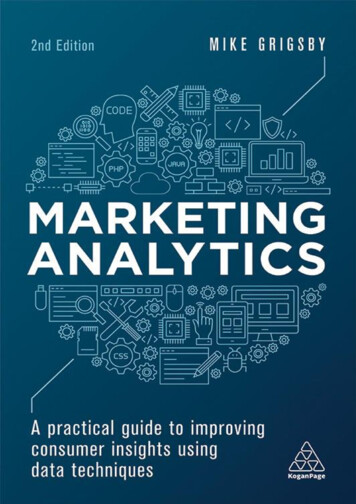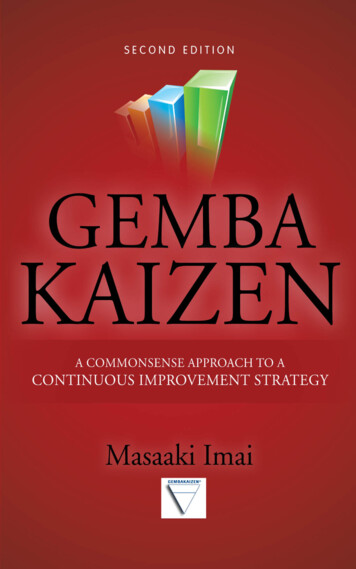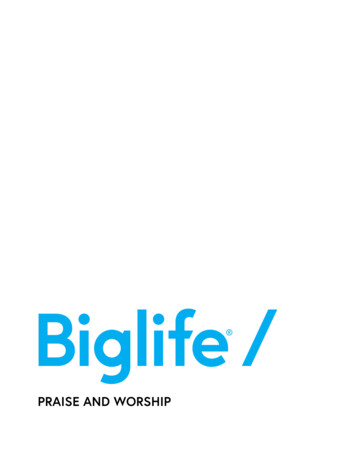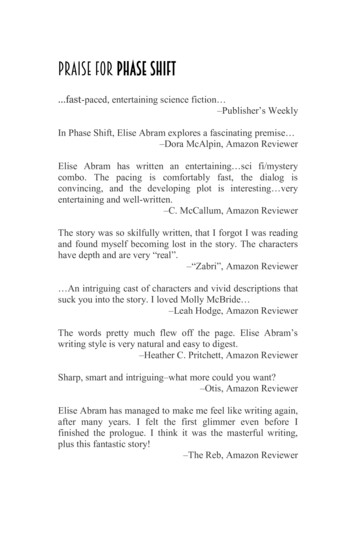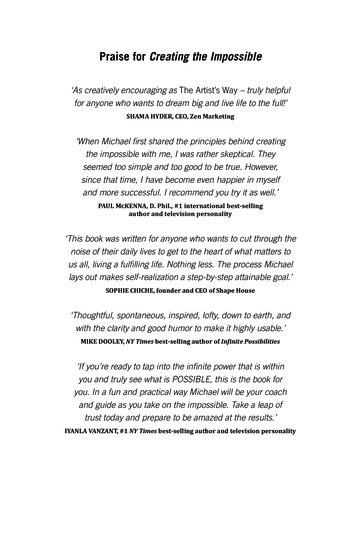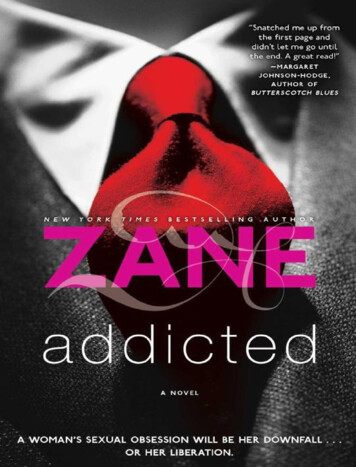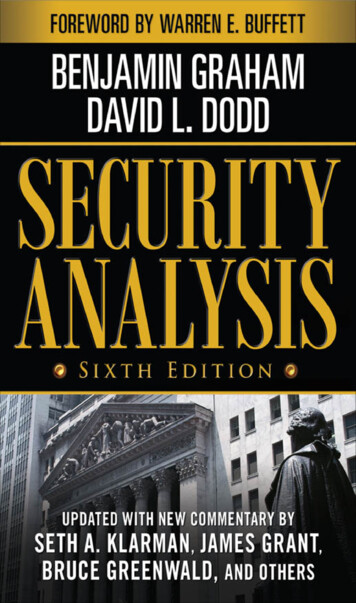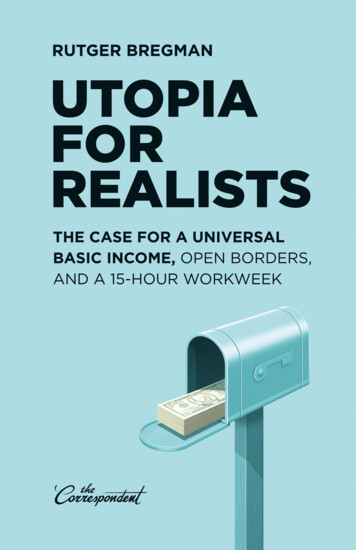
Transcription
Praise for Utopia for Realists“Brilliant, comprehensive, truly enlightening, and eminentlyreadable. Obligatory reading for everyone worried about thewrongs of present-day society and wishing to contribute to theircure.” – Zygmunt Bauman, one of the world’s most eminent socialtheorists, author of more than 50 books“If you’re bored with hackneyed debates, decades-old right-wingand left-wing clichés, you may enjoy the bold thinking, freshideas, lively prose, and evidence-based arguments in Utopia forRealists.” – Steven Pinker, Johnstone Professor of Psychology,Harvard University, and author of The Blank Slate and The BetterAngels of Our Nature“This book is brilliant. Everyone should read it. Bregman showsus we’ve been looking at the world inside out. Turned right wayout we suddenly see fundamentally new ways forward. If we canget enough people to read this book, the world will start to become a better place.” – Richard Wilkinson, co-author of The SpiritLevel: Why More Equal Societies Almost Always Do Better“Rutger Bregman makes a compelling case for Universal BasicIncome with a wealth of data and rooted in a keen understandingof the political and intellectual history of capitalism. He shows themany ways in which human progress has turned a Utopia into aEutopia – a positive future that we can achieve with the right policies.” – Albert Wenger, entrepreneur and partner at Union SquareVentures, early backers of Twitter, Tumblr, Foursquare, Etsy, andKickstarter
“Learning from history and from up-to-date social science canshatter crippling illusions. It can turn allegedly utopian proposalsinto plain common sense. It can enable us to face the future withunprecedented enthusiasm. To see how, read this superbly written, upbeat, insightful book.” – Philippe van Parijs, Harvard University professor and cofounder of the Basic Income Earth Network“A wonderful call to utopian thinking around incomes and theworkweek, and a welcome antidote to the pessimism surroundingrobots taking our jobs.” – Charles Kenny, senior fellow at the Center for Global Development and author of The Upside of Down:Why the Rise of the Rest is Great for the West“A bold call for utopian thinking and a world without work –something needed more than ever in an era of defeatism and lackof ambition. Highly recommended!” – Nick Srnicek, co-author ofInventing the Future: Postcapitalism and a World Without Work“The impact of this book in the Netherlands has been huge. Notonly did Rutger Bregman launch a highly successful and long-running debate in the media, he also inspired a movement across thecountry that is putting his ideas into practice. Now it’s time for therest of the world.” – Joris Luyendijk, bestselling author of Swimming with Sharks: My Journey into the World of the Bankers“Rutger Bregman writes with an exceptional voice. He shows bothdeep knowledge of the history and technical aspects of Basic Income and the ability to discuss it in a way that is meaningful andcaptivating even to people who are completely new to the topic.”– Karl Widerquist, Associate Professor at SFS-Qatar, GeorgetownUniversity, and co-chair of the Basic Income Earth Network
“Utopia for Realists is an important book, a wonderfully readablebreath of fresh air, a window thrown open to a better future. Aspoliticians and economists are asking how to increase productivity,ensure full employment, and downsize government, Bregman asks:What actually makes life worth living and how can we get there?The answers, it turns out, are already there, and Bregman combines deep research with wit, challenging us to think anew abouthow we want to live and who we want to be. Required reading.”– Philipp Blom, historian and author of The Vertigo Years. Changeand Culture in the West, 1900-1914 and A Wicked Company. TheForgotten Radicalism of the European Enlightenment“If energy, enthusiasm and aphorism could make the world better, then Rutger Bregman’s book would do it. Even in translationfrom the Dutch, the writing is powerful and fluent. a boisterously good read.” – The Independent
Utopia for Realists
2016 The CorrespondentCover Design by Harald Dunnink and Martijn van Dam (Momkai)English Translation by Elizabeth MantonAuthor Illustration by Cléa DieudonnéInfographics by MomkaiLayout Design by Pre Press Media Groepisbn 978 90 825 2030 9First editionOriginal title Gratis geld voor iedereen: en nog vijf grote ideeëndie de wereld kunnen veranderen
Contents1.The Return of Utopia2.A 15-Hour Workweek3.Why We Should Give Free Money to Everyone4.Race Against the Machine5.The End of Poverty6. The Bizarre Tale of President Nixon andHis Basic Income Bill7.Why It Doesn’t Pay to Be a Banker8.New Figures for a New Era9.Beyond the Gates of the Land of Plenty10. How Ideas Change the 209247
A map of the world that does not include Utopiais not worth even glancing at, for it leaves out theone country at which Humanity is alwayslanding. And when Humanity lands there, itlooks out, and, seeing a better country, sets sail.Progress is the realization of Utopias.oscar wilde (1854–1900)
1The Return of UtopiaLet’s start with a little history lesson:In the past, everything was worse.For roughly 99% of the world’s history, 99% of humanity waspoor, hungry, dirty, afraid, stupid, sick, and ugly. As recently as the17th century, the French philosopher Blaise Pascal (1623–1662)described life as one giant vale of tears. “Humanity is great,” hewrote, “because it knows itself to be wretched.” In Britain, fellowphilosopher Thomas Hobbes (1588–1679) concurred that humanlife was basically “nasty, brutish, and short.”But in the last 200 years, all of that has changed. In just a fraction of the time that our species has clocked on this planet, billions of us are suddenly rich, well nourished, clean, safe, smart,healthy, and occasionally even beautiful. Where 94% of the world’spopulation still lived in extreme poverty in 1820, by 1981 that percentage had dropped to 44%, and now, just a few decades later, itis under 10%.1If this trend holds, the extreme poverty that has been an abidingfeature of life will soon be eradicated for good. Even those we stillcall poor will enjoy an abundance unprecedented in world history.In the country where I live, the Netherlands, a homeless personreceiving public assistance today has more to spend than the average Dutch person in 1950, and four times more than people inHolland’s glorious Golden Age, when the country still ruled theseven seas.2For centuries, time all but stood still. Obviously, there was plenty13
Two centuries of stupendous ed States60India55504540Sierra LeoneCongo1800Netherlands35United States30Qatar25China20India15Sierra 00Life expectancy (in years)65Per capita income (in U.S. dollars)North and South AmericaSub-Saharan AfricaEurope and Central AsiaSouth AsiaMiddle East and North AfricaEast Asia and PacificLand of PlentyThis is a diagram that takes a moment to absorb. Each circle represents a country. The bigger the circle, the bigger the population. The bottom section showscountries in the year 1800; the top shows them in 2012. In 1800, life expectancyin even the richest countries (e.g. the Netherlands, the United States) still fellshort of that in the country with the lowest health rating (Sierra Leone) in 2012.In other words: in 1800, all countries were poor in both wealth and health,whereas today, even sub-Saharan Africa outperforms the most affluent countries of 1800 (despite the fact that incomes in the Congo have hardly changed inthe last 200 years). Indeed, ever more countries are arriving in the “Land ofPlenty,” at the top right of the diagram, where the average income now tops 20,000 and life expectancy is over 75.Source: Gapminder.org14
to fill the history books, but life wasn’t exactly getting better. If youwere to put an Italian peasant from 1300 in a time machine anddrop him in 1870s Tuscany he wouldn’t notice much of a difference.Historians estimate that the average annual income in Italyaround the year 1300 was roughly 1,600. Some 600 years later– after Columbus, Galileo, Newton, the scientific revolution, theReformation and the Enlightenment, the invention of gunpowder,printing, and the steam engine – it was. still 1,600.3 Six hundredyears of civilization, and the average Italian was pretty much wherehe’d always been.It was not until about 1880, right around the time AlexanderGraham Bell invented the telephone, Thomas Edison patented hislightbulb, Carl Benz was tinkering with his first car, and JosephineCochrane was ruminating on what may just be the most brilliantidea ever – the dishwasher – that our Italian peasant got swept upin the march of progress. And what a wild ride it has been. Thepast two centuries have seen explosive growth both in populationand prosperity worldwide. Per capita income is now ten timeswhat it was in 1850. The average Italian is 15 times as wealthy as in1880. And the global economy? It is now 250 times what it wasbefore the Industrial Revolution – when nearly everyone, everywhere was still poor, hungry, dirty, afraid, stupid, sick, and ugly.The Medieval UtopiaThe past was certainly a harsh place, and so it’s only logical thatpeople dreamed of a day when things would be better.One of the most vivid dreams was the land of milk and honeyknown as “Cockaigne.” To get there you first had to eat your waythrough three miles of rice pudding. But it was worth the effort,because on arriving in Cockaigne you found yourself in a landwhere the rivers ran with wine, roast geese flew overhead, pancakes grew on trees, and hot pies and pastries rained from the15
skies. Farmer, craftsman, cleric – all were equal and kicked backtogether in the sun.In Cockaigne, the Land of Plenty, people never argued. Instead,they partied, they danced, they drank, and they slept around.“To the medieval mind,” the Dutch historian Herman Pleijwrites, “modern-day western Europe comes pretty close to a bonafide Cockaigne. You have fast food available 24/7, climate control,free love, workless income, and plastic surgery to prolong youth.”4These days, there are more people suffering from obesity worldwide than from hunger.5 In Western Europe, the murder rate is40 times lower, on average, than what it was in the Middle Ages,and if you have the right passport, you’re assured an impressivesocial safety net.6Maybe that’s also our biggest problem: Today, the old medievaldream of the utopia is running on empty. Sure, we could managea little more consumption, a little more security – but the adverseeffects in the form of pollution, obesity, and Big Brother are looming ever larger. For the medieval dreamer, the Land of Plenty wasa fantasy paradise – “An escape from earthly suffering,” in thewords of Herman Pleij. But if we were to ask that Italian farmerback in 1300 to describe our modern world, his first thought woulddoubtless be of Cockaigne.In fact, we are living in an age of Biblical prophecies come true.What would have seemed miraculous in the Middle Ages is nowcommonplace: the blind restored to sight, cripples who can walk,and the dead returned to life. Take the Argus II, a brain implantthat restores a measure of sight to people with genetic eye con ditions. Or the Rewalk, a set of robotic legs that enables paraplegics to walk again. Or the Rheobatrachus, a species of frog thatwent extinct in 1983 but, thanks to Australian scientists, has quiteliterally been brought back to life using old DNA. The Tasmaniantiger is next on this research team’s wish list, whose work is partof the larger “Lazarus Project” (named for the New Testamentstory of a death deferred).16
Meanwhile, science fiction is becoming science fact. The firstdriverless cars are already taking to the roads. Even now, 3D printers are rolling out entire embryonic cell structures, and peoplewith chips implanted in their brains are operating robotic armswith their minds. Another factoid: Since 1980, the price of 1 wattof solar energy has plummeted 99% – and that’s not a typo. Ifwe’re lucky, 3D printers and solar panels may yet turn Karl Marx’sideal (all means of production controlled by the masses) into areality, all without requiring a bloody revolution.For a long time, the Land of Plenty was reserved for a small elitein the wealthy West. Those days are over. Since China has openeditself to capitalism, 700 million Chinese have been lifted out ofextreme poverty.7 Africa, too, is fast shedding its reputation foreconomic devastation; the continent is now home to six of theworld’s ten fastest-growing economies.8 By the year 2013, six billion of the globe’s seven billion inhabitants owned a cell phone.(By way of comparison, just 4.5 billion had a toilet.)9 And between1994 and 2014, the number of people with Internet access worldwide leaped from 0.4% to 40.4%.10Also in terms of health – maybe the greatest promise of the Landof Plenty – modern progress has trumped the wildest imaginingsof our ancestors. Whereas wealthy countries have to content themselves with the weekly addition of another weekend to the averagelifetime, Africa is gaining four days a week.11 Worldwide, life expectancy grew from 64 years in 1990 to 70 in 201212 – more thandouble what it was in 1900.Fewer people are going hungry, too. In our Land of Plenty wemight not be able to snatch cooked geese from the air, but thenumber of people suffering from malnutrition has shrunk bymore than a third since 1990. The share of the world populationthat survives on fewer than 2,000 calories a day has dropped from51% in 1965 to 3% in 2005.13 More than 2.1 billion people finallygot access to clean drinking water between 1990 and 2012. In thesame period, the number of children with stunted growth went17
down by a third, child mortality fell an incredible 41%, and maternal deaths were cut in half.And what about disease? History’s number one mass murderer,the dreaded smallpox, has been completely wiped out. Polio has allbut disappeared, claiming 99% fewer victims in 2013 than in1988. Meanwhile, more and more children are getting immunizedagainst once-common diseases. The worldwide vaccination ratefor measles, for example, has jumped from 16% in 1980 to 85%today, while the number of deaths has been cut by more thanthree-quarters between 2000 and 2014. Since 1990, the TB mortality rate has dropped by nearly half. Since 2000, the number ofpeople dying from malaria has been reduced by a quarter, and sohas the number of AIDS deaths since 2005.Some figures seem almost too good to be true. For example, 50years ago, one in five children died before reaching their fifthbirthday. Today? One in 20. In 1836, the richest man in the world,one Nathan Meyer Rothschild, died due to a simple lack of antibiotics. In recent decades, dirt-cheap vaccines against measles,tetanus, whooping cough, diphtheria, and polio have saved morelives each year than world peace would have saved in the 20thcentury.14Obviously, there are still plenty of diseases to go – cancer, forone – but we’re making progress even on that front. In 2013, theprestigious journal Science reported on the discovery of a way toharness the immune system to battle tumors, hailing it as thebiggest scientific breakthrough of the year. That same year sawthe first successful attempt to clone human stem cells, a promising development in the treatment of mitochondrial diseases, including one form of diabetes.Some scientists even contend that the first person who will liveto celebrate their 1,000th birthday has already been born.15All the while, we’re only getting smarter. In 1962, 41% of kidsdidn’t go to school, as opposed to under 10% today.16 In mostcountries, the average IQ has gone up another three to five points18
10090807060Diphtheria, tetanus, whooping cough50Tuberculosis40Polio30Measles20Hepatitis 61984198201980Global immunization coverage, in % of the populationThe victory of vaccinesSource: World Health Organizationevery ten years, thanks chiefly to improved nutrition and education. Maybe this also explains how we’ve become so much morecivilized, with the past decade rating as the most peaceful in all ofworld history. According to the Peace Research Institute in Oslo,the number of war casualties per year has plummeted 90% since1946. The incidence of murder, robbery, and other forms of criminality is decreasing, too.“The rich world is seeing less and less crime,” The Economistreported not long ago. “There are still criminals, but there are everfewer of them and they are getting older.”1719
19601955195001945War casualties per 100,000 world inhabitantsWar has been on the declineSource: Peace Research Institute OsloA Bleak ParadiseWelcome, in other words, to the Land of Plenty.To the good life. To Cockaigne, where almost everyone is rich,safe, and healthy. Where there’s only one thing we lack: a reasonto get out of bed in the morning. Because after all, you can’t reallyimprove on paradise. Back in 1989, the American philosopherFrancis Fukuyama already noted that we had arrived in an erawhere life has been reduced to “economic calculation, the endlesssolving of technical problems, environmental concerns, and thesatisfaction of sophisticated consumer demands.”18Notching up our purchasing power another percentage point, orshaving a couple off our carbon emissions; perhaps a new gadget– that’s about the extent of our vision. We live in an era of wealthand overabundance, but how bleak it is. There is “neither art norphilosophy,” Fukuyama says. All that’s left is the “perpetual caretaking of the museum of human history.”20
According to the Irish writer Oscar Wilde, upon reaching theLand of Plenty, we should once more fix our gaze on the farthesthorizon and rehoist the sails. “Progress is the realization of Utopias,” he wrote. But the far horizon remains blank. The Landof Plenty is shrouded in fog. Precisely when we should be shouldering the historic task of investing this rich, safe, and healthyexistence with meaning, we’ve buried utopia instead. There’s nonew dream to replace it because we can’t imagine a better worldthan the one we’ve got. In fact, most people in wealthy countriesbelieve children will actually be worse off than their parents.19But the real crisis of our times, of my generation, is not that wedon’t have it good, or even that we might be worse off later on.No, the real crisis is that we can’t come up with anything better.The Destruction of the Grand NarrativeThis book isn’t an attempt to predict the future.It’s an attempt to unlock the future. To fling open the windowsof our minds. Of course, utopias always say more about the timein which they were imagined than about what’s actually in store.The utopian Land of Plenty tells us all about what life was like inthe Middle Ages. Grim. Or rather, that the lives of almost everyone almost everywhere have almost always been grim. After all,every culture has its own variation on the Land of Plenty.20Simple desires beget simple utopias. If you’re hungry, you dreamof a lavish banquet. If you’re cold, you dream of a toasty fire. Facedwith mounting infirmities, you dream of eternal youth. All of thesedesires are reflected in the old utopias, conceived when life was stillnasty, brutish, and short. “The earth produced nothing fearful, nodiseases,” fantasized the Greek poet Telecides in the fifth centuryB.C., and if anything was needed, it would simply appear. “Everycreek bed flowed with wine. [.] Fish would come into your house,grill themselves, and then lie down on your table.”2121
But today we stamp out dreams of a better world before they cantake root. Dreams have a way of turning into nightmares, goes thecliché. Utopias are a breeding ground for discord, violence, evengenocide. Utopias ultimately become dystopias; in fact, a utopia isa dystopia. “Human progress is a myth,” goes another cliché. Andyet, we ourselves have managed to build the medieval paradise.True, history is full of horrifying forms of utopianism – fascism,communism, Nazism – just as every religion has also spawnedfanatical sects. But if one religious radical incites violence, shouldwe automatically write off the whole religion? So why write off theutopianism? Should we simply stop dreaming of a better worldaltogether?No, of course not. But that’s precisely what is happening. Optimism and pessimism have become synonymous with consumer confidence or the lack thereof. Radical ideas about a different world have become almost literally unthinkable. The expectations of what we as a society can achieve have been dramaticallyeroded, leaving us with the cold, hard truth that without utopia, allthat remains is a technocracy. Politics has been watered down toproblem management. Voters swing back and forth not becausethe parties are so different, but because it’s barely possible to tellthem apart, and what now separates right from left is a percentagepoint or two on the income tax rate.22We see it in journalism, which portrays politics as a game inwhich the stakes are not ideals, but careers. We see it in academia,where everybody is too busy writing to read, too busy publishingto debate. In fact, the 21st-century university resembles nothingso much as a factory, as do our hospitals, schools, and TV networks. What counts is achieving targets. Whether it’s the growthof the economy, audience shares, publications – slowly but surely,quality is being replaced by quantity.And driving it all is a force sometimes called “liberalism,” anideology that has been all but hollowed out. What’s important nowis to “just be yourself” and “do your thing.” Freedom may be our22
highest ideal, but ours has become an empty freedom. Our fear ofmoralizing in any form has made morality a taboo in the publicdebate. The public arena should be “neutral,” after all – yet neverbefore has it been so paternalistic. On every street corner we’rebaited to booze, binge, borrow, buy, toil, stress, and swindle. Whatever we may tell ourselves about freedom of speech, our values are suspiciously close to those touted by precisely the companies that can pay for prime-time advertising.23 If a political party ora religious sect had even a fraction of the influence that the advertising industry has on us and our children, we’d be up in arms. Butbecause it’s the market, we remain “neutral.”24The only thing left for government to do is patch up life in thepresent. If you’re not you’re not following the blueprint of a docile,content citizen, the powers that be are happy to whip you intoshape. Their tools of choice? Control, surveillance, and repression.Meanwhile, the welfare state has increasingly shifted its focusfrom the causes of our discontent to the symptoms. We go to adoctor when we’re sick, a therapist when we’re sad, a dietitianwhen we’re overweight, prison when we’re convicted, and a jobcoach when we’re out of work. All these services cost vast sums ofmoney, but with little to show for it. In the U.S., where the cost ofhealthcare is the highest on the planet, the life expectancy formany is actually going down.All the while, the market and commercial interests are enjoyingfree reign. The food industry supplies us with cheap garbage loaded with salt, sugar, and fat, putting us on the fast track to the doctor and dietitian. Advancing technologies are laying waste to evermore jobs, sending us back again to the job coach. And the adindustry encourages us to spend money we don’t have on junk wedon’t need in order to impress people we can’t stand.25 Then wecan go cry on our therapist’s shoulder.That’s the dystopia we are living in today.23
The Pampered GenerationIt is not – I can’t emphasize this enough – that we don’t have itgood. Far from it. If anything, kids today are struggling under theburden of too much pampering. According to Jean Twenge, a psychologist at San Diego State University who has conducted detailed research into the attitudes of young adults now and in thepast, there has been a sharp rise in self-esteem since the 1980s.The younger generation considers itself smarter, more responsible, and more attractive than ever.“It’s a generation in which every kid has been told, ‘You can beanything you want. You’re special,’” explains Twenge.26 We’vebeen brought up on a steady diet of narcissism, but as soon aswe’re released into the great big world of unlimited opportunity,more and more of us crash and burn. The world, it turns out, iscold and harsh, rife with competition and unemployment. It’s nota Disneyland where you can wish upon a star and see all yourdreams come true, but a rat race in which you have no one butyourself to blame if you don’t make the grade.Not surprisingly, that narcissism conceals an ocean of uncertainty. Twenge also discovered that we have all become a lot morefearful over the last decades. Comparing 269 studies conductedbetween 1952 and 1993, she concluded that the average child living in early 1990s North America was more anxious than psychiatric patients in the early 1950s.27 According to the World HealthOrganization, depression has even become the biggest healthproblem among teens and will be the number one cause of illnessworldwide by 2030.28It’s a vicious circle. Never before have so many young adults beenseeing a psychiatrist. Never before have there been so many earlycareer burnouts. And we’re popping antidepressants like never before. Time and again, we blame collective problems like unemployment, dissatisfaction, and depression on the individual. If successis a choice, then so is failure. Lost your job? You should have worked24
harder. Sick? You must not be leading a healthy lifestyle. Unhappy?Take a pill.In the 1950s, only 12% of young adults agreed with the statement “I’m a very special person.” Today 80% do,29 when the fact is,we’re all becoming more and more alike. We all read the samebestsellers, watch the same blockbusters, and sport the samesneakers. Where our grandparents still toed the lines imposed byfamily, church, and country, we’re hemmed in by the media, marketing, and a paternalistic state. Yet even as we become more andmore alike, we’re well past the era of the big collectives. Membership of churches, political parties, and labor unions has taken atumble, and the traditional dividing line between right and leftholds little meaning anymore. All we care about is “resolving problems,” as though politics could be outsourced to management consultants.Sure, there are some who try to revive the old faith in progress.Is it any wonder that the cultural archetype of my generation isThe Nerd, whose apps and gadgets symbolize the hope of economic growth? “The best minds of my generation are thinkingabout how to make people click ads,” a former math whiz at Facebook recently lamented.30Lest there be any misunderstanding: It is capitalism that openedthe gates to the Land of Plenty, but capitalism alone cannot sustain it. Progress has become synonymous with economic prosperity, but the 21st century will challenge us to find other ways ofboosting our quality of life. And while young people in the Westhave largely come of age in an era of apolitical technocracy, wewill have to return to politics again to find a new utopia.In that sense, I’m heartened by our dissatisfaction, because dissatisfaction is a world away from indifference. The widespreadnostalgia, the yearning for a past that never really was, suggeststhat we still have ideals, even if we have buried them alive.True progress begins with something no knowledge economycan produce: wisdom about what it means to live well. We have to25
do what great thinkers like John Stuart Mill, Bertrand Russell, andJohn Maynard Keynes were already advocating 100 years ago: to“value ends above means and prefer the good to the useful.”31 Wehave to direct our minds to the future. To stop consuming ourown discontent through polls and the relentlessly bad-news media. To consider alternatives and form new collectives. To transcend this confining zeitgeist and recognize our shared idealism.Maybe then we’ll also be able to again look beyond ourselvesand out at the world. There we’ll see that good old progress is stillmarching along on its merry way. We’ll see that we live in a marvelous age, a time of diminishing hunger and war and of surgingprosperity and life expectancies. But we’ll also see just how muchthere still is left for us – the richest 10%, 5%, or 1% – to do.The BlueprintIt’s time to return to utopian thinking.We need a new lodestar, a new map of the world that once againincludes a distant, uncharted continent – “Utopia.” By this I don’tmean the rigid blueprints that utopian fanatics try to shove downour throats with their theocracies or their five-year plans – theyonly subordinate real people to fervent dreams. Consider this:The word utopia means both “good place” and “no place.” Whatwe need are alternative horizons that spark the imagination. AndI do mean horizons in the plural; conflicting utopias are the lifeblood of democracy, after all.But before we go any farther, let’s first distinguish between twoforms of utopian thought.32 The first is the most familiar, the utopia of the blueprint. Great thinkers like Karl Popper and HannahArendt and even an entire current of philosophy, postmodernism,have sought to upend this type of utopia. They largely succeeded;theirs is still the last word on the blueprinted paradise.Instead of abstract ideals, blueprints consist of immutable rules26
that tolerate no dissension. The Italian poet Tommaso Campanella’sThe City of the Sun (1602) offers a good example. In his utopia, or,rather, dystopia, individual ownership is strictly prohibited, everybody is obligated to love everybody else, and fighting is punishable by de
“Utopia for Realists is an important book, a wonderfully readable breath of fresh air, a window thrown open to a better future. As . One of the most vivid dreams was the land of milk and honey known as “Cockaigne.” To get there you first had to eat your way through
